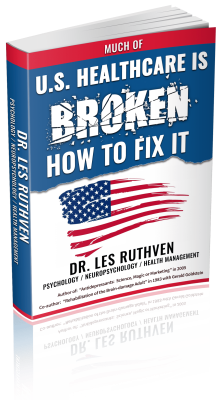Last updated on January 6th, 2024 at 08:33 am
What your doctor leaves out is often more than what you were told
By Les Ruthven, Ph.D.
Email: dr.les.ruthven@gmail.com
Blog: www.ruthvenassessments.com
This blog was in reaction to an article that appeared in the Wichita Eagle on Aug. 7, 2022 on understanding normal memory reduction with advancing age, mild cognitive impairment that allows near normal daily functioning and the several progressive dementias which eventually results in an inability to live alone safely. I could argue with a few of the points expressed in the article but I was more concerned with what was left out of the article, especially on the sources giving rise to the memory impairment/mild cognitive impairment (Ci) and the dementias.
Unlike the content of the article what is the number one source of memory/ cognitive impairment in individuals experiencing such symptoms?
Pharmaceuticals such as psychiatric drugs, steroids, opioids, some cancer drugs and others are the major cause of those patients complaining of impaired cognition. Many of these just mentioned drugs, unlike the dementias, cause reversible brain impairment which often subsides with tapering of the putative drug. However, there is research evidence that some of these drugs with chronic use result in permanent structural damage to the brain but the medical profession seems to prefer to ignore such research. Many physicians do not accept a drug cause of the patient’s Ci but attribute the impairment to a non-drug source such as the patient’s “depression”.
Cases of structural brain damage during major surgery with a general anesthetic is another cause of brain damage which seems to be known but ignored by physicians.
In this during surgery the brain is deprived of oxygen due either to the general anesthetic or botched surgery or both. Years ago I did a neuropsych assessment on a man who had been treated unsuccessfully with psychiatric drugs for two years. I diagnosed disabling structural brain damage and attributed it to his major surgery two years previously and not to a psychiatric disorder. Actually his wife thanked me for making the diagnosis even though the brain damage was not reversible. However, I anticipated tapering the psychiatric drugs would give some improvement in her husband’s day to day functioning.
How can we begin to assess reversible Ci in healthcare?
Clinical neuropsychology and neurology do a very good job in identifying structural brain damage in the healthcare system but in the absence of a systematic approach by experts (not the patient’s physician) the eventual diagnosis is neither very timely or cost efficient. A health plan carve out in the hands of experts is needed for the early identification of Ci in the healthcare population.
The whole area of reversible brain impairment has been ignored by neurology and even clinical neuropsychology. The latter’s neuropsych batteries are excellent in diagnosing structural brain damage but thus far these batteries do not seem to identify cases of reversible brain impairment. The following is a link to an online computer screening test that may contribute to the need for finding a path to assess the neglected field of reversible brain impairment.
https://ruthvenassessments.com/ria-impaired-performance-based-on-clinical-and-research-data/
The author developed the above assessment for a more timely and cost effective path to the final Ci diagnosis. My research colleague (the neuropsychologist Dr. Gerald Goldstein, now diseased) believed that the RIA had a lower cognitive floor than standard neuropsych batteries. Perhaps the RIA may be a key to finally being able to identify reversible brain impairment, which if accomplished would vastly improve the quality and lower the cost of healthcare.


